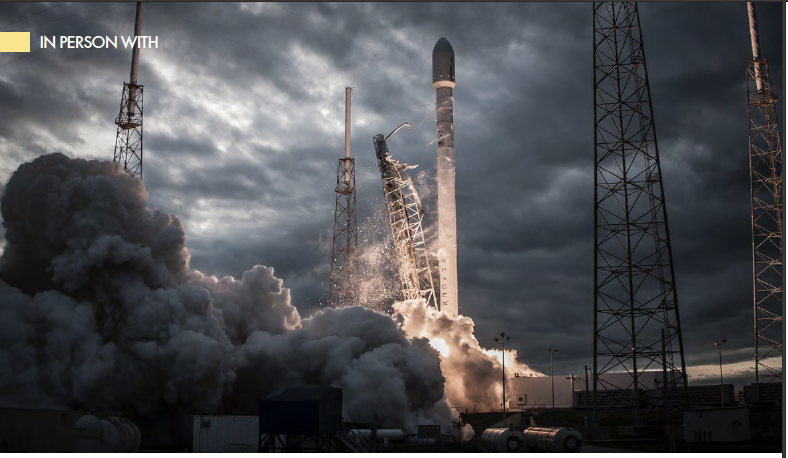YBhg Datuk Ts. Dr. Hj. Aminuddin Hassim, Chairman of Malaysian Space Board
The Malaysian Space Board was launched to enforce the Malaysian Space Board Act 2022 (Act 834) gazetted in early 2022. Its role is to enact regulations related to the act passed to govern and advance the nation’s space sector per international accords. As a result, Malaysia will join the Philippines as one of the first ASEAN nations to establish a space board. This is exciting news for space enthusiasts, high-technology geeks, and industry players. For this edition, myForesight® has the opportunity to get insights from YBhg Datuk Ts. Dr. Hj. Aminuddin Hassim, Chairman of the Malaysian Space Board, on the space industry, the local space scenario, policies and acts, and how stakeholders can contribute to the national agenda.
Japan’s National Space Programme
The success of Japan’s national space programme has offered Malaysia numerous insights into its own space related endeavours. For over half a century, the Japanese have made great efforts in space development— relying only on domestic technologies to develop reliable and cost-effective launch vehicles, record consecutive successful launches, and venture into space exploration. Their early realisation of the significance of space worthiness prompted Japan to be an original party to the Outer Space Treaty, formally the Treaty on ‘Principles Governing the Activities of States in the Exploration and Use of Outer Space, including the Moon and Other Celestial Bodies’ in 1967. They are also one of the signatories to the Artemis Accords, a non-binding multilateral arrangement between the United States government and other world governments, which addresses the international principles for exploring and exploiting space resources.
The country has also ratified four United Nations treaties, namely the Agreement on the Rescue of Astronauts, the Return of Astronauts and the Return of Objects Launched into Outer Space 1968, the Convention on International Liability for Damage Caused by Space Objects 1972, and the Convention on Registration of Objects Launched into Outer Space 1975. In 2008, Japan enacted their Basic Space Law, creating a basic framework for space development and utilisation. It was a significant turning point in the history of their space development as it was the first national law providing general provisions for space development use in Japan, putting them at par with other leading spacefaring countries.
Upon the enactment of the law, the Strategic Headquarters for National Space Policy was established as the highest decision-making body for national space policy. The National
Space Policy Secretariat was created in 2012 within the Cabinet Office, playing the coordinator of space policies and space-related activities. The Committee on National Space Policy, with members from industry, academia, and other experts, was also formed in the same year as the advisor to the Secretariat. In 2016, they enacted the Space Activities Act, which establishes general rules for the launch and control of satellites, and the Remote Sensing Act, which regulates remote sensing activities.
Learning from Japan
We can draw lessons from Japan, especially on the significance of strategic collaboration and international diplomacy in the peaceful use and exploration of space. The United Nations Office for Outer Space Affairs (UNOOSA) promotes these agendas. It provides a platform for experience and expert sharing for member states, capacity development on space policy and space law, as well as guidelines for the long- term sustainability of outer space activities. Malaysia is grateful to be acknowledged by the UNOOSA as one of the leading drivers in the new chapter of space activities.
I believe that Malaysia must adhere to international instruments, rules, and norms to defend Malaysia’s right to use space to maintain continuous space capacity at an affordable cost. Malaysia has so far ratified two of the five accords, with three more soon to be signed. The initiative to
complete this process is documented in the Malaysia Space Exploration (MSE 2030) Blueprint and is projected to be concluded in 2030.
Another aspect that Japan has taught us is the importance of National Space Policy and Space Law, including good governance to ensure they are regulated and enforced effectively. Our National Space Policy was established in 2017, and five years later, the Malaysia Space Act was enacted—including the formation of the Malaysia Space Board and the Space Regulatory Division. The National Space Committee (JANGKA) is chaired by the Minister of Science, Technology, and Innovation to coordinate national space activities and centralise all related resources. These initiatives are imperative to expedite the operation, research and development, as well as technology development in the space sector.
Last but not least, the synergy between stakeholders comprised of decision-makers, academia, experts, and industry plays an important role in contributing to the success of any national space programme. Therefore, in recognition of the global development of the space industry and its international circumstances, Malaysia will be publishing our own Space Industry Strategic Plan (SISP2030) to create a holistic and resilient space industry with greater growth across the industry’s value chain through the adoption of advanced innovative technology, sustainable funding, robust workforce and efficient governance.

The Government has gazetted the Malaysian Space Board Act 2022 (Act 834) on 22 January 2022 to strengthen the space sector governance. It covers four pillars: governance; authorisation regime; supervision and regulation; and indemnification and liability. The enactment of the Act is in line with Thrust 1 of National Space Policy 2030, namely Strengthen the Governance to Optimise the Access to Space Capabilities, and emphasis is given to the safety aspect or space worthiness to ensure the nation’s space activities are carried out responsibly, safely, securely and adhere to all international legal regime.
Looking at the global scenario, major spacefaring nations have domestic laws governing their space activities, which also indicates that they are responsible space actors. This, in turn, enables them to be parties to United Nations Space Treaties. This multilateral agreement provides guidance and rules for all member states to conduct space activities safely and sustainably. With the domestic Space Act and Malaysia’s intention to ratify the United Nations Outer Space Treaties, Malaysia is now eligible to lawfully conduct its own space activities within Malaysian territory and support the “United Nations Space 2030 Agenda” as well as UN guidelines such as the “Long-Term Sustainability of Outer Space Activities”.
The Malaysian Space Board Act 2022 is anticipated to have a transformative impact on the nation’s economy, innovation, and talent. It will provide a framework for the Malaysian space industry’s growth that could create new opportunities for businesses, entrepreneurs, and skilled workers. In order to increase investor trust and ensure that the activities they want to invest in are subject to clear norms and regulations, a supportive domestic legal structure for the space industry is essential.
Economic Growth
Space is vital in terms of the world economy, strategic thinking, terrestrial military strategy, geopolitics, human rights, commercial enterprise, technological innovation and, frankly, the future of humankind. But venturing into space activities, especially the upstream sector, is expensive due to the cutting-edge technology used in space exploration and the enormous risks involved in space endeavours. The establishment of Act 834 provides legal predictability to support commercial investment by reducing the uncertainty faced by the industry player when conducting space activities in Malaysia. Legal assurance is fundamental in attracting interest from private investors in the New Space era.
Apart from the legal clarity, the enactment of Act 834 also provides administration and technical transparency in the governance of space activities in Malaysia. The space activities authorisation regime is created under the Act and spearheaded by the Malaysian Space
Board. Related Regulations, which will outline details of operating the authorisation regime under the Act, are currently being drafted. All the elements mentioned should promote good transparency in space sector governance, which will boost potential investors’ confidence.
Expedite Innovation and Talents
The Malaysian government still exerts the greatest influence over the country’s space programmes. It is anticipated that the space programme will soon shift from being run by the government to being run by the private sector, including international investors. The enactment of Act 834 is expected to be the pull factor in attracting these players to upgrade their existing aviation capabilities into space capabilities. New and wider participation of private investments in the local space industry is expected to spur economic growth in the country, leading to more market-driven innovation and new job opportunities. Increased employment opportunities in the space sector will help attract and retain local talent, essential in building a skilled workforce and fostering innovation and creativity.
Aspiration and Participation of Stakeholders
With the establishment and enforcement of Act 834, Malaysia aspires to become a responsible nation in the peaceful use of outer space by ensuring that national
space activities, including those conducted by the private sector, follow international space law principles.
All the stakeholders, whether from the government, industry, or academia, shall play their roles to ensure the fulfilment of spaceworthiness requirements under the Act. Through the Malaysian Space Board and other regulators, the government shall authorise only qualified space activities and conduct continuous monitoring and supervision of space activities until the end of the lifecycle to create a sustainable space ecosystem. The industry shall demonstrate that their planned space activities follow the safety and security requirements of the Act. Academia shall develop and strengthen human capital capabilities to provide expertise, knowledge, and skills to ensure national space activities’ sustainability.
The Future of Malaysia’s Space Landscape
On the future of Malaysia’s space landscape, I foresee that the future of the space segment ecosystem in Malaysia will develop rapidly in the next 10 years and subsequently become more diverse. The application of space technology will be applied at all levels of government agencies and in the private sector alongside the boom of the upstream and downstream local space industry, including the manufacturing of space components and the spinoffs of space technology applications. Not limited to that, this may include creating novel ideas such as artificial intelligence, robotics, and bioengineering and developing innovative applications for space-related data. A promising future for space exploration and development in Malaysia as the country’s space landscape continues to change.
I believe that our local expertise will enable Malaysia to be the centre of excellence in assembly, integration, and test (AIT) for small to medium size satellites for the ASEAN region. Malaysia aspires to be the leader in space law practice in Southeast Asia and become one of the top three countries in Southeast Asia in terms of space technology research and development, as well as achieve 50% self-reliance in space technology by 2030.
Based on thorough planning and implementation by the Malaysian Space Agency (MYSA) through the MSE 2030, The Space Industry Strategic Plan 2030 (SISP 2030), and the Malaysian Space Board Act 2022 (Act 834), Malaysia should not fall behind in the space technology race. We should seize the opportunity to develop our local space industry. This feat seems far-fetched without significant government support and smart local and international collaborations with the commercial sector. We hope to see more professionals, especially those from startups and spin off businesses, among the local talent collaborating with the government to propose new initiatives or joint ventures which will hasten the growth of Malaysia’s space industry.
In addition, I anticipate that the income from the space sector could contribute up to RM10 billion or 1% of the country’s GDP, and the space ecosystem could create up to 5,000 highly skilled job opportunities for Malaysians.









